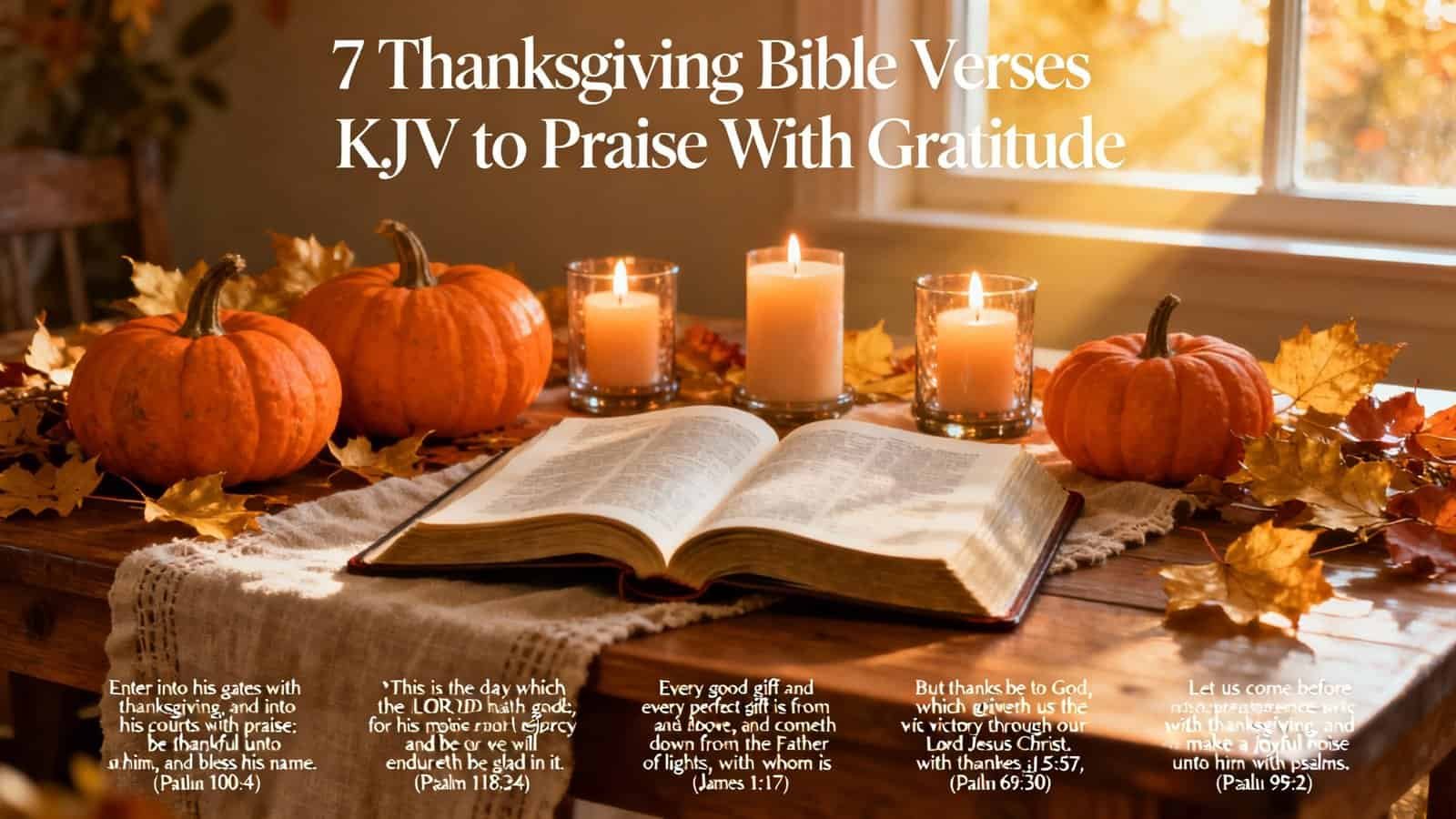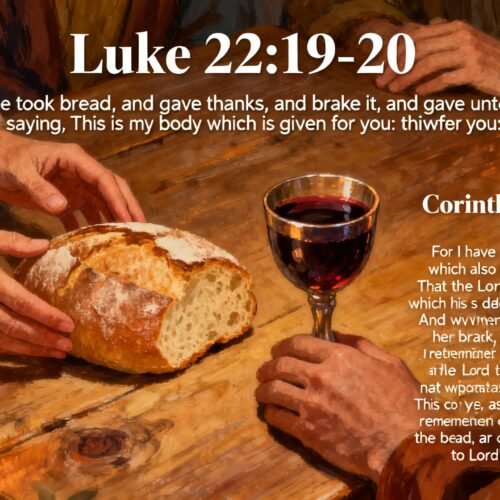
10 Nov 7 Thanksgiving Bible Verses KJV to Praise With Gratitude
You’ll discover that thanksgiving isn’t just polite gratitude—it’s your spiritual key to God’s presence. When you declare “O give thanks unto the Lord; for he is good” (Psalm 107:1), you’re anchoring your soul in His unchanging nature. Through verses like “Enter into his gates with thanksgiving” (Psalm 100:4) and “In every thing give thanks” (1 Thessalonians 5:18), you’re learning Heaven’s language. These seven KJV passages transform complaint into praise, opening doors to deeper communion with your Creator.
Table of Contents
Key Takeaways
- Psalm 107:1 declares God’s goodness and enduring mercy, making it a powerful daily thanksgiving declaration during challenges.
- Psalm 100:4 teaches entering God’s presence through thanksgiving, with gratitude serving as the key to deeper communion.
- 1 Thessalonians 5:18 commands giving thanks in everything as God’s will, reflecting trust in His sovereignty amid trials.
- Philippians 4:6 combines thanksgiving with prayer and supplication, transforming anxious petitions into confident conversations with God.
- 2 Corinthians 9:15 expresses gratitude for God’s unspeakable gift of salvation, representing the highest form of thanksgiving.
Give Thanks Unto the Lord for He Is Good – Psalm 107:1

Gratitude transforms the heart when you recognize God’s unchanging goodness in your life. Psalm 107:1 declares, “O give thanks unto the LORD, for he’s good: for his mercy endureth for ever.” This verse isn’t merely a suggestion—it’s your gratitude anthem, calling you to acknowledge God’s steadfast character.
When you’re overwhelmed by circumstances, this scripture anchors your soul in truth. God’s goodness doesn’t fluctuate with your feelings or situations. His mercy remembered throughout generations remains constant today. You’ll find peace when you shift focus from temporary troubles to His eternal nature.
Make this verse your daily declaration. Start each morning proclaiming His goodness. When challenges arise, remind yourself that His mercy hasn’t expired. You’re not thanking God because everything’s perfect, but because He remains good regardless.
This thanksgiving practice reshapes your perspective, helping you see His faithfulness even in difficult seasons.
Enter His Gates With Thanksgiving – Psalm 100:4
You’re invited to approach God’s throne through thanksgiving, as Psalm 100:4 reveals that gratitude serves as your spiritual access card into His presence.
When you enter His gates with thanksgiving and His courts with praise, you’re not just reciting words—you’re activating a divine principle that transforms your prayer life and worship experience.
This verse teaches that thankfulness isn’t merely good manners before God; it’s the very key that opens doors to deeper communion with Him.
Gates of Divine Access
Through the ancient gates of the temple, worshippers once approached God’s presence with offerings and songs of praise, and this same pathway remains open to you today through thanksgiving. These heavenly entryways aren’t physical structures but spiritual permissions granted when you approach God with grateful hearts.
You’re crossing sacred thresholds every time you lift your voice in thanksgiving. The access mysteries Paul spoke of—boldly approaching the throne of grace—become yours through gratitude. You don’t need special credentials or perfect circumstances. Your thankful heart becomes the key that unlocks divine doors.
When you enter His gates with thanksgiving, you’re not just reciting words; you’re activating a spiritual principle. God’s presence dwells where praise resounds, and your gratitude creates the atmosphere where He moves freely.
Thanksgiving as Entry Key
Standing before heaven’s entrance, your thanksgiving acts as the divine key that opens what no amount of striving can unlock. Psalm 100:4 reveals God’s design—you’re invited to “enter into his gates with thanksgiving.” This isn’t merely ceremonial protocol; it’s spiritual reality.
Your gratitude gateway transforms from locked barrier to welcoming threshold when you approach with genuine thanks. You’ll discover that praise precedes presence, and thanksgiving precedes transformation. The thankful entrance isn’t earned through perfection but accessed through acknowledgment of God’s goodness.
When you’re struggling to sense God’s nearness, return to this foundational truth. Begin with “Thank you, Lord” and watch closed doors swing open. Your thanksgiving doesn’t manipulate God; it aligns your heart with His perpetual welcome. He’s already thrown wide the gates—your gratitude simply helps you see they’ve been open all along.
Courts of Holy Praise
Beyond the gates you’ve entered with thanksgiving lies a sacred space demanding deeper reverence—His courts require praise.
You’ve crossed sacred thresholds through gratitude, but now you’re called to join heaven’s worship cadence. The psalmist doesn’t stop at thanksgiving; he beckons you into courts where praise becomes your sanctuary song.
In these courts, you’re not alone. Heavenly choirs surround God’s throne with continuous worship, and you’re invited to harmonize with their eternal anthem. Your praise here isn’t casual—it’s intentional, focused, and holy.
You’ll discover that thanksgiving was merely preparation for this deeper encounter. When you align your heart with heaven’s rhythm, earthly concerns fade. You’re standing where angels worship, where saints gather, where God’s presence dwells most intimately.
In Everything Give Thanks – 1 Thessalonians 5:18
When you read “In every thing give thanks: for this is the will of God in Christ Jesus concerning you” (1 Thessalonians 5:18), you’re discovering God’s specific will for your life—a thankful heart in all circumstances.
This doesn’t mean you’ll feel thankful for every situation, but rather you can find reasons to thank God within every situation, whether it’s a season of blessing or trial.
Making gratitude your daily practice transforms your perspective, as you’ll begin seeing God’s hand at work even in life’s difficulties.
God’s Will For You
As you navigate life’s ups and downs, God’s will for your attitude remains remarkably clear and unchanging: “In every thing give thanks: for this is the will of God in Christ Jesus concerning you” (1 Thessalonians 5:18). This isn’t merely a suggestion—it’s His divine purpose for how you’re to approach each circumstance.
When you can’t understand why certain trials come, remember that gratitude aligns you with God’s redemptive plan. He’s working all things for your good (Romans 8:28), even when you can’t see it. You’re not thanking Him for the pain itself, but trusting His sovereignty over it. This thanksgiving becomes your spiritual discipline, transforming complaints into worship and doubt into faith. God’s will isn’t complicated here—He simply asks you to thank Him, knowing He’s worthy of your trust.
Every Circumstance Counts
The scope of God’s command to give thanks stretches far beyond your comfortable moments—it encompasses every single circumstance you’ll ever face. “In every thing give thanks” doesn’t leave room for exceptions or escape clauses. This radical call builds gratitude resilience that anchors your soul when storms rage. You’re not thanking God for the pain itself, but trusting His sovereignty within it.
This perspective shift transforms how you view hardships. Instead of asking “Why me?” you’ll ask “What now, Lord?” Every trial becomes soil for spiritual growth. Your disappointments, delays, and difficulties all count as opportunities to demonstrate faith through thanksgiving. When you can’t trace God’s hand, you can still trust His heart. This practice isn’t denial—it’s declaring God’s goodness remains unchanged regardless of your circumstances.
Daily Gratitude Practice
Daily thanksgiving transforms from spiritual discipline into supernatural delight when you make it your morning priority. You’ll discover that morning reflections anchored in Scripture reshape your entire day’s perspective. Start gratitude journaling with three specific blessings God’s provided—name them precisely before His throne.
Practice mindful blessings throughout your day. When you’re stuck in traffic, thank God for transportation. While washing dishes, praise Him for provision. This isn’t positive thinking; it’s biblical obedience to “in everything give thanks” (1 Thessalonians 5:18).
Try habit stacking: pair existing routines with thanksgiving. As you brew coffee, list God’s mercies. While brushing teeth, recall answered prayers. You’re training your heart to recognize God’s fingerprints everywhere, transforming mundane moments into worship opportunities.
Thanksgiving With Prayer and Supplication – Philippians 4:6
When anxiety threatens to overwhelm your heart, Philippians 4:6 offers God’s prescription for peace: “Be careful for nothing; but in every thing by prayer and supplication with thanksgiving, let your requests be made known unto God.” This verse doesn’t merely suggest thanksgiving as an afterthought to prayer—it commands you to weave gratitude into the very fabric of your petitions.
You’re called to bring faithful petitions before God’s throne while remembering His past faithfulness. This isn’t passive resignation but calm surrender—actively choosing to trust while thanking Him for what He’s already done. When you combine supplication with thanksgiving, you’re acknowledging God’s sovereignty even as you present your needs.
This divine formula transforms prayer from desperate pleading into confident conversation. You’re not begging an reluctant deity but approaching a loving Father who’s already proven Himself trustworthy. Each thankful prayer becomes an act of worship that displaces anxiety with peace.
Let the Peace of God Rule With Thankfulness – Colossians 3:15
Peace isn’t meant to be a visitor in your heart but a ruling authority, and Colossians 3:15 reveals how thankfulness cements this divine governance: “And let the peace of God rule in your hearts, to the which also ye are called in one body; and be ye thankful.” The word “rule” here means to act as an umpire—making decisive calls about what thoughts and emotions you’ll allow to dominate your inner life.
When you’re facing conflict resolution in relationships or battling internal turmoil, God’s peace serves as your decisive judge. This inner peace doesn’t operate alone—it’s paired with thankful leadership over your attitudes. You can’t maintain spiritual harmony while harboring ingratitude.
Notice Paul connects peace to corporate unity: “in one body.” Your thankfulness affects the entire church’s atmosphere. When you let gratitude anchor God’s peace in your heart, you’re contributing to the collective spiritual harmony believers share. This isn’t passive acceptance but active submission to peace’s authority through deliberate thanksgiving.
Offer the Sacrifice of Thanksgiving – Psalm 116:17
Lifting your voice in thanksgiving transforms mere words into a holy offering, as Psalm 116:17 declares: “I will offer to thee the sacrifice of thanksgiving, and will call upon the name of the LORD.”
The psalmist’s language reveals something profound—thanksgiving isn’t just an emotion you feel but a sacrifice you present.
You’re called to bring your gratitude offering deliberately, not casually. This worship sacrifice costs you something—perhaps your pride when circumstances aren’t ideal, or your time when you’d rather focus elsewhere.
Yet it’s precisely this intentional act of personal devotion that honors God most deeply.
Consider how communal thanksgiving amplifies individual praise. When you join others in declaring God’s goodness, you’re participating in something ancient and sacred.
You’re not merely expressing thanks; you’re offering worship that ascends before God’s throne. Make your thanksgiving sacrificial today—speak it when you don’t feel it, proclaim it amid trials, and watch how this offering transforms your heart.
Thanks Be Unto God for His Unspeakable Gift – 2 Corinthians 9:15

Beyond the sacrifices of praise you offer stands God’s supreme gift that defies human expression. Paul’s declaration in 2 Corinthians 9:15 erupts from a heart overwhelmed by divine generosity: “Thanks be unto God for his unspeakable gift.” You can’t fully articulate what Christ means to your soul—His worth transcends language itself.
This gift mystery deepens as you contemplate its scope. God didn’t merely send help; He gave Himself. The Creator became creation, the Judge became the judged, the Holy One bore your sin. When you’re struggling to express gratitude, remember that even Paul couldn’t find adequate words.
Let this verse anchor your grace reflection today. You’ve received what money can’t buy and merit can’t earn. God’s gift includes forgiveness, adoption, inheritance, and eternal life—all wrapped in the person of Jesus. Your thanksgiving finds its highest expression when you simply acknowledge, with Paul, that God’s gift remains beautifully beyond description.
Frequently Asked Questions
How Can I Teach Children to Memorize Thanksgiving Bible Verses?
You’ll help children memorize Thanksgiving verses through engaging song games that set Scripture to simple melodies they’ll naturally remember. Create verse rewards like sticker charts or small prizes when they recite passages correctly. Practice daily during meals, incorporating hand motions for kinesthetic learners. Write verses on colorful cards for visual reinforcement. Most importantly, model gratitude yourself while explaining how God’s Word transforms hearts, making memorization both joyful and meaningful.
What’s the Difference Between Thanksgiving and Praise in the Bible?
You’ll find thanksgiving focuses on expressing gratitude for God’s specific blessings and provisions in your life, while praise exalts His character and attributes regardless of circumstances.
The thankfulness distinction becomes clear when you’re offering grateful worship – thanksgiving says “thank you for what You’ve done,” but praise declares “You’re worthy for who You are.”
Both honor God, yet praise transcends your situation, lifting His name even through trials when you can’t see blessings.
Are There Specific Prayers to Say Before Reading Thanksgiving Verses?
You don’t need specific prayers before reading thanksgiving verses, but short prayers can prepare your heart.
Try opening blessings like “Lord, open my eyes to see Your goodness” or “Father, help me receive Your truth with gratitude.”
Simply asking God to reveal His faithfulness through His Word creates sacred space.
You’re inviting the Holy Spirit to illuminate Scripture, transforming reading into worship.
Your sincere heart matters more than perfect words.
How Often Should I Practice Gratitude According to Scripture?
Scripture calls you to practice daily gratitude as a continuous lifestyle, not just occasional moments.
You’ll find Paul commanding “in everything give thanks” (1 Thessalonians 5:18) and to “be thankful” (Colossians 3:15), indicating habitual thanksgiving should mark your every day.
David exemplified this, declaring “I will bless the Lord at all times” (Psalm 34:1).
Make gratitude your moment-by-moment response, weaving thankfulness throughout your daily routine and conversations.
Can I Use Modern Bible Translations Instead of KJV for Thanksgiving?
Yes, you can absolutely use modern translations for thanksgiving!
While the KJV holds special significance for many believers, God’s Word speaks powerfully through contemporary language versions like NIV, ESV, or NLT.
These modern translations help you grasp Scripture’s meaning more clearly, making your gratitude more heartfelt.
What matters isn’t the translation you choose, but that you’re engaging with God’s Word to express genuine thanksgiving from your heart.
Conclusion
You’ve discovered powerful verses that transform ordinary moments into opportunities for praise. Don’t just read these scriptures—live them. When challenges arise, you’ll find strength in giving thanks. Make gratitude your daily practice, whether you’re entering prayer or facing trials. God’s given you His unspeakable gift of salvation, so let thanksgiving overflow from your heart. As you offer the sacrifice of praise, you’ll experience His peace ruling in your life through grateful worship.











No Comments